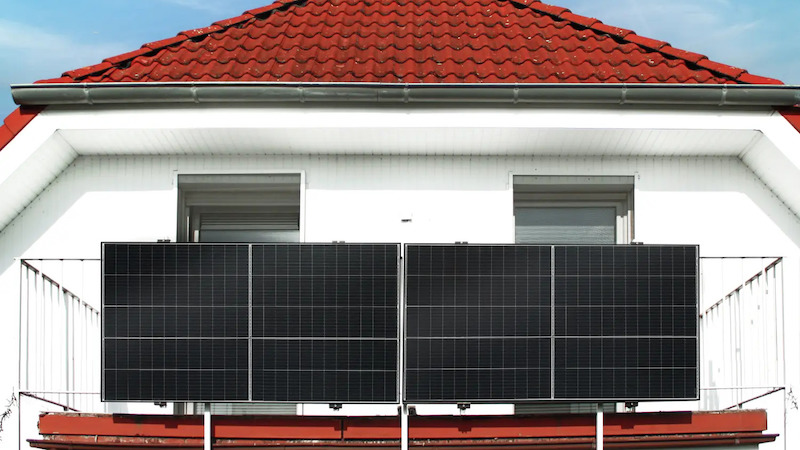Can my landlord forbid me to have a balcony power plant?
While electricity prices are exploding, more and more people are relying on energy from photovoltaic systems. However, this raises the question, especially in rented apartments: Can my landlord forbid me to have a balcony power plant? The backgrounds.
Since electricity prices have continued to rise, photovoltaic systems have been in greater demand than ever. This trend has been apparent for some time. Especially for tenants, mini solar systems for their own balconies are becoming increasingly popular more popular.
But before you bring a balcony power plant home, you need to find out about the legal situation. As always, there are a few things to consider when it comes to in-house sustainability.
Contents
Can my landlord forbid me to have a balcony power plant?
In Germany live over 50 percent of people for rent. That means they can’t make changes to their home just like that. A large photovoltaic system is therefore out of the question for many.
Balcony power plants are therefore a popular alternative to at least cover part of the electricity consumption with solar energy. However, landlords are often skeptical about the installation and try to ban it. In the meantime, however, courts have also dealt with the topic – and in favor of tenants decided.
Verdict: Landlords are usually not allowed to ban balcony power plants
The Stuttgart District Courtt already dealt with the lawsuit of a landlord in spring 2021, who demanded that her tenant remove an attached balcony power plant.
The tenant had previously asked for permission several times in vain. Ultimately, he installed the mini solar system despite the plaintiff’s objection. Although the district court partly agreed with the landlady, it decided in favor of the tenant.
Against “No” from the landlord: balcony power plant serves to protect the environment
Although the district court of Stuttgart basically agreed with the plaintiff, it ruled that the tenant’s balcony power plant had advantages for environmental protection. And that is the state goal in the course of the politically desired energy transition towards renewable energies and in Art. 20a GG anchored.
Accordingly, in 1990 case law already considered a solar system on a terrace to be included in the contractual use (AG Munich judgment of October 4, 1990 – 214 C 24821/90, BeckRS 1990, 05848 marginal number 17, beck-online). . In the thirty years since this decision was made, the importance of using sustainable energy sources has been increasingly emphasized, not least due to numerous state support programs, so that the use of solar systems is objectively advantageous. Against this background, the discretion of the landlord is limited by the principle of good faith (§ 242 BGB) regarding the toleration of the installation of a solar system at least to the extent that the landlord does not refuse the tenant the use of a solar system on the balcony without a valid, factual reason can.
Balcony Power Plant: These requirements must be met
At the same time, the Stuttgart district court also lists in its judgment which requirements must be met for a proper installation of a mini solar system.
Accordingly, a corresponding balcony power plant must be installed permitted under building law, visually not disturbing, easily rebuildable and professionally installed without deterioration of the rental propertyt be In addition, allowed by the plant no increased risk of fire or other danger go out.
It is also important to comply with the VDE standard for plug-in photovoltaic systems. The following applies:
- Maximum 600 watts: A balcony power plant must not feed more into the socket. This limit exists for the inverter, which limits the feed-in. If a photovoltaic system exceeds this specification, it is considered a large solar system and is subject to other regulations.
- Connection via Wieland power socket: It must be installed by a qualified electrician. However, the federal government and the VDE are already working to ensure that Schuko plugs are also officially approved in the future.
Balcony power plant: Obtain the consent of the landlord
Although the Stuttgart District Court ultimately ruled in favor of the defendant, the court’s order nonetheless indicated that the landlord’s consent must be sought.
In most cases, landlords are not allowed to simply refuse their “okay”. You can, however, request a number of documents. The North German Broadcasting explained this, for example, using the Rostock housing company WIRO.
Among other things, tenants must present a data sheet with proof of the CE mark, proof of registration with the network operator and in the market master data register, liability insurance and photo documentation of the installed system.
Not every legal case ends the same
In principle, therefore, balcony power plants are permitted as soon as they meet the relevant judicially determined requirements. But beware: Although the district court of Stuttgart ruled in favor of the tenant, that does not mean that a similar situation always ends up this way.
Because at the same time different reported media in February 2023 also that a family in Ilmenau, Thuringia, was evicted from their apartment because of a balcony power plant. In this case, the landlord had not given the consent and won the lawsuit.
Federal government wants to privilege the installation of balcony power plants
However, the federal government is currently planning to make the installation of balcony power plants easier. The official statement.
In addition, the installed capacity should also be increased and rapid commissioning made possible. The corresponding draft law is currently being drawn up and will then be presented to the Bundestag.
Also interesting:



